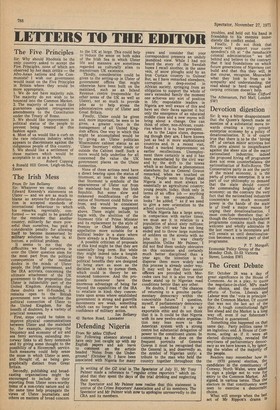Defending Nigeria
From Sir miles Clifford Sir: Following absence abroad I have only just caught up with my English papers and ask leave to comment on the article headed 'Notes from the Underground' (October 9). I have been associated with Nigeria for many years and consider that your correspondent presents an unduly jaundiced view. While I had not heard the story of the Swedish buses I recall another, in the same vein, of snow ploughs sold by an Iron Curtain country to Guinea! But, as I have remarked elsew.here, corruption is deep-rooted in African society, springing from an obligation to support the whole of one's extended family the moment one achieves any sort of position in life; responsible leaders in Nigeria are well aware of this and have set their faces against it but only the emergence of an educated middle class and a new mores will bring about a change. One can think of other, non-African, countries where it is no less prevalent. As to the Lagos slums, depressing though they are, I have known just as bad in more sophisticated countries and, in a recent visit, found a marked improvement on earlier recollections. Unemployment there certainly is and it has been exacerbated by the civil war and by the drift to the towns which is so familiar a phenomenon elsewhere; but as General Gowon remarked, when we touched on this, "People seem to forget that Nigeria is and must always be essentially an agricultural country; young people, today, think only in terms of an office job — anything else is not respectable. It looks" he added, " as if we need to give a new orientation to the school curriculum."
While Nigeria has a large army, in comparison with earlier times, we must see it in relation to a population of about sixty millions; again, the civil war has not long ended and to throw large numbers of soldiers on the streets with no jobs to go to was clearly impossible. Unlike Mr Palmer, I did not find them unduly obtrusive on this occasion and certainly much better disciplined than a year ago; the intention is to disperse them more widely and this process is already under way. It may well be that their senior officers are provided with Mercedes cars but it is also true that these stand up to Nigerian road conditions better than any other.
He doubts, I read, "the chances of returning to a genuine parliamentary democracy within the conceivable future." I question, myself, if parliamentary democracy as we understand it is an exportable ethic and do not think that it is. It could be that Nigeria with its new twelve-state organisation may lean more to the American system with a strong centre but substantial delegation of power to the constituent states. In commenting as he does on the frequent portraits of General Gowon it must be recognised that the General is, and deservedly so, the symbol of Nigerian unity; a tribute to the man who held the country together throughout the troubles, and held out his hand in friendship to his enemies immediately the conflict ended.
Finally, I do not think that history will support your correspondent's tilt at "the ramshackle colonial administration" we left behind and believe to the contrary that it laid foundations on which future generations of Nigerians can build and that this they will, in due course, recognise. Meanwhile what they look to from us is sympathy and understanding; the road ahead is hard enough and carping criticism doesn't help. Miles Clifford The Athenaeum, Pall Mall, London SW'














































 Previous page
Previous page